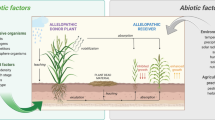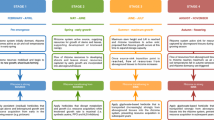Abstract
Weeds can directly affect arthropods by providing favorable microclimates, food, shelter, mating sites and oviposition substrates. Indirect effects on herbivores and higher trophic level arthropods can occur if weed species interact with each other and with crop plants modifying plant physiology, chemical and visual cues and competing for resources. Hence, weed management can interfere in many different ways with arthropods. Evidence from literature is that our understanding of the mechanisms underlying the observed effects is still very limited. Higher plant diversity does not necessarily mean increased biological control. Genetically Modified Herbicide-Tolerant (GMHT) crops offer new possibilities for weed management with potential consequences for conservation biological control. For example, farmers have more flexibility in timing herbicide applications (early vs. late overall sprays), and band spraying in row crops have been shown to modify weed abundance and composition in favor of a number of predators and parasitoids. There is some evidence that maximum weed control with overall glyphosate spray of GMHT crops results in reduced weed biomass and lower arthropod abundance, including beneficial species. Conversely, many articles show that maintaining some weed enhances arthropod densities and natural biological control. GMHT crops may increase adoption of minimum and no tillage systems with possible effects on weeds and arthropods. Weed management systems with GMHT plants have a great potential to alter plant diversity in crops in favor of conservation biological control. However, careful consideration of other management options such as crop and herbicide rotation should be evaluated to make sustainable use of the benefits of GMHT crops.
Similar content being viewed by others
References
Albajes R, Lumbierres B, Pons X (2009) Responsiveness of arthropod herbivores and their natural enemies to modified weed management in corn. Environ Entomol 38(3):944–954
Ammon HU (1988) Do actual thresholds favor the build-up of herbicide resistance in weed populations? In: Cavalloro R, El Titi A (eds) Weed control in vegetable production. Commission of the European Communities Balkema Publisher, Rotterdam, pp 281–289
Bale JS, van Lenteren JC, Bigler F (2008) Biological control and sustainable food production. Philos Trans R Soc B 363:761–776
Bigler F, Waldburger M, Frei G (1995) Maisanbauverfahren im Vergleich: Insekten und Spinnen als Nützlinge. Agrarforschung 9:383–387
Brooks DR, Bohan DA, Champion GT et al (2003) Invertebrate response to the management of genetically modified herbicide-tolerant and conventional spring crops I. Soil-surface-active invertebrates. Philos Trans R Soc Lond B 358:1847–1862
Cerdeira AL, Duke SO (2006) The current status and environmental impacts of glyphosate resistant crops: a review. J Environ Qual 35:1633–1658
Christoffoleti PJ, Galli AJB, Carvalho SJP (2008) Glyphosate sustainability in South American cropping systems. Pest Manag Sci 64:422–427
Deware AM (2009) Weed control in glyphosate-tolerant maize in Europe. Pest Manag Sci. doi:10.1002/ps.1806
Deware AM, May MJ, Woiwod IP et al (2003) A novel approach to the use of genetically modified herbicide tolerant crops for environmental benefit. Proc R Soc Lond B 270:335–340
Deware AM, Champion GT, May MJ, Pidgeon JD (2005) The UK farm scale evaluations of GM crops-a post script. Outlook Pest Manag 16:164–173
Dubois D, Ammon HU (1997) Habitat-management of sugar beet pests by a different strategy of weed control. In: Proc 60th IIRB Congress, Cambridge, UK, pp 243–251
Givens WA, Shaw DR, Kruger GR et al (2009) Survey of tillage trends following the adoption of glyphosate-resistant crops. Weed Technol 23:150–155
Haughton AJ, Champion GT, Hawes C et al (2003) Invertebrate responses to the management of genetically modified herbicide-tolerant and conventional spring crops II. Within field epigeal and aerial arthropods. Philos Trans R soc Lond B 358:1863–1877
Heard MS, Hawes GT, Champion GT et al (2003a) Weeds in fields with contrasting conventional and genetically modified herbicide-tolerant crops I. Effects on abundance and diversity. Philos Trans R Soc Lond B 358:1819–1832
Heard MS, Hawes CT, Champion GT et al (2003b) Weeds in fields with contrasting conventional and genetically modified herbicide-tolerant crops II. Effects on individual species. Philos Trans R Soc Lond B 358:1833–1846
Holland JM (2004) The environmental consequences of adopting conservation tillage in Europe: reviewing the evidence. Agric Ecosyst Environ 103:1–25
James C (2010) Global status of commercialized biotech/GM crops. ISAAA Brief 42. ISAAA Ithaca, NY, USA
Kladivko EJ (2001) Tillage systems and soil ecology. Soil Tillage Res 61:61–76
May MJ (2001) Crop protection in sugar beet. R Soc Chem Pesticide Outlook 12:188–191
May MJ (2003) Economic consequences for UK farmers of growing GM herbicide tolerant sugar beet. Ann Appl Biol 142:41–48
May MJ, Champion GT, Dewar AM et al (2005) Management of genetically modified herbicide tolerant sugar beet for spring and autumn environmental benefit. Proc R Soc B 272:111–119
McLaughlin A, Mineau P (1995) The impact of agricultural practices on biodiversity. Agric Ecosyst Environ 55:201–212
Norris RF, Kogan M (2000) Interactions between weeds, arthropod pests, and their natural enemies in managed ecosystems. Weed Sci 48:94–158
Norris RF, Kogan M (2005) Ecology of interactions between weeds and arthropods. Annu Rev Entomol 50:479–503
Roy DB, Bohan DA, Haugthon AJ et al (2003) Invertebrates and vegetation of field margins adjacent to crops subject to contrasting herbicide regimes in the Farm Scale Evaluations of genetically modified herbicide-tolerant crops. Philos Trans R Soc Lond B 358:1879–1898
Shearin AF, Reberg-Horton SC, Gallandt ER (2007) Direct effects of tillage on the activity density of ground beetle (Coleoptera: Carabidae) weed seed predators. Environ Entomol 36(5):1140–1146
Stinner BR, House GJ (1990) Arthropods and other invertebrates in conservation-tillage agriculture. Annu Rev Entomol 35:299–318
Thorbeck P, Bilde T (2004) Reduced number of generalist arthropod predators after crop management. J Appl Ecol 41:526–538
Conflict of interest
The authors F. Bigler and R. Albajes declare that the research was not sponsored and that they have no conflict of interest.
Author information
Authors and Affiliations
Corresponding author
Additional information
Conference Proceedings: “Decision Making and Science—The Balancing of Risk Based Decisions that Influence Sustainability of Agricultural Production”, 7th and 8th October 2010 in Berlin, Germany, Sponsored by the OECD Co-operative Research Programme.
Rights and permissions
About this article
Cite this article
Bigler, F., Albajes, R. Indirect effects of genetically modified herbicide tolerant crops on biodiversity and ecosystem services: the biological control example. J. Verbr. Lebensm. 6 (Suppl 1), 79–84 (2011). https://doi.org/10.1007/s00003-011-0688-1
Published:
Issue Date:
DOI: https://doi.org/10.1007/s00003-011-0688-1




